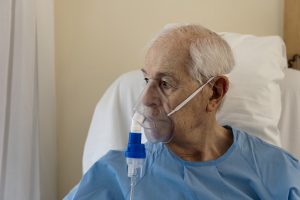PTSD Lasting Effect for Some Sepsis Survivors
May 2, 2018
Surviving a life-threatening illness produces many emotions.The ones we expect may be gratefulness for having survived the crisis and relief at being  discharged from the hospital. But many who survive serious illnesses like sepsis also find they may experience other emotions. They may be angry, fearful, anxious, or depressed. For some, these feelings pass after they process their experience. For others, the bad feelings linger and result in lasting feelings that are difficult to understand.
discharged from the hospital. But many who survive serious illnesses like sepsis also find they may experience other emotions. They may be angry, fearful, anxious, or depressed. For some, these feelings pass after they process their experience. For others, the bad feelings linger and result in lasting feelings that are difficult to understand.
Post-sepsis syndrome is an umbrella term for many of the physical and mental problems that may affect sepsis survivors, including post-traumatic stress disorder (PTSD). Sepsis survivors are more likely to develop symptoms of PTSD than other patients who had been treated in an intensive care unit. This is a significant fact because not only are sepsis survivors at risk for the disorder, a study done in 2013 at Johns Hopkins University, found that sepsis survivors who had a history of depression before they became ill had a higher risk of developing PTSD after their discharge.
What is PTSD?
Post-traumatic stress disorder is a mental health condition caused by a trauma. The trauma can be a one-time thing (such as being victim of a crime) or long-term (such as living in a war zone). No one knows why some people bounce back after a trauma while others develop PTSD or why some people experience PTSD symptoms within weeks of the trauma and others may only start having symptoms years later.
Patients who are treated for sepsis in an ICU undergo several traumas. They have a serious illness, potentially bringing them to the brink of dying. Their body is subjected to numerous medical interventions. They are often in severe pain, and they feel scared and helpless. Add to this being in the busy ICU environment 24 hours a day, and the situation is primed for a psychological reaction like PTSD.
Some of the symptoms of PTSD include:
- Having intrusive memories
- Reliving events
- Having upsetting dreams or nightmares about the event
- Avoiding anything that may remind you of your experience
- Feelings of hopelessness, depression, and anxiety
- Being easily startled
- Trouble sleeping or concentrating
- Sleeping too much
- Getting irrationally angry or aggressive
The symptoms may come and go, or they may linger.
Family members may be depressed too
When a loved one is critically ill, family members often feel helpless. They may relive events, wondering if they could have done something different, even once the emergency is over. They may feel guilt over past issues or fear for the future. Their experience is very different from that of the patient, but they, too, have gone through a stressful time and this may go unrecognized, and may lead to depression or anxiety.
Recognizing the problem
Recognizing the problem is the first step towards helping sepsis survivors and their loved ones to deal with lasting psychological issues. People who experience signs of PTSD, depression, or anxiety should acknowledge this and seek help from their doctor or qualified mental healthcare practitioner. These conditions can often be successfully managed through a combination of self-care, counseling or medications.
May is Mental Health Month, a time to encourage people to speak up about mental health issues. Please visit the Sepsis Alliance PTSD page to learn more about PTSD, its relationship to sepsis, diagnosis, and treatment.





























